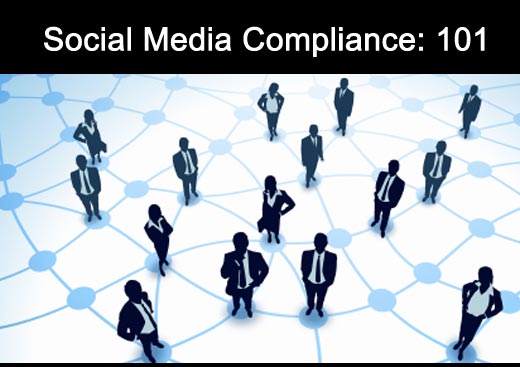Social networking is gaining rapid adoption by business professionals to increase brand awareness, client prospecting, and customer retention and loyalty. As reported by Smarsh, 79 percent of Fortune 500 companies use Facebook, Twitter and LinkedIn to communicate with customers. Financial marketing and communications firm Ledermark found that 85 percent of financial services professionals under 50 are using social media. As this communication channel matures, these numbers are sure to increase.
Social media communication carries with it a wide array of legal risks, and as such requires the same compliance principles that govern e-mail and IM retention — this extends to tweets and LinkedIn profiles, as evidenced in recent cases and regulations. In the City of Ontario v. Quon, the Supreme Court unanimously ruled that the City of Ontario did not violate its employee’s right to privacy by auditing messages sent over a company-issued pager. FINRA Regulatory Notice 10-06 affirmed that FINRA-registered financial firms are responsible for supervising the use of social networking sites and retaining messages.
Whether your firm allows social networking or not, employees are using these sites to help them build business, leaving the company open to compliance violations. Therefore, it is essential to ensure company internal policies and archiving systems extend to these channels to remain compliant. Smarsh has provided the following information with regard to social media compliance.
Click through for a summary of issues involved in social media compliance.
79 percent of Fortune 500 companies use Facebook, Twitter and LinkedIn to communicate with customers. 73 percent of financial professionals have a profile or social media account. 85 percent of financial advisors under age 50 are using social networks.
69 percent of respondents report that their companies have gained measurable business benefits from social technologies, including more innovative products and services, more effective marketing, better access to knowledge, lower costs of doing business and higher revenues.
44 percent of financial professionals recognize that by using social media there is “significant business potential for businesses like mine.”
You may be exposed to compliance risk if your employees are editing their profile content on LinkedIn or Facebook; “favoriting” or “liking” third-party posts; allowing LinkedIn recommendations to be displayed; communicating via status updates, tweets, or Facebook/LinkedIn mail without tagging, retaining and post reviewing the content; or using social networks without a governance policy in place.
In January 2010, FINRA issued guidance on blogs and social networking sites in Regulatory Notice 10-06. As such, it was determined that electronic communication regulations extend to social media sites such as blogs and social networking sites. Firms must adopt and define reasonably designed policies and procedures to protect investors.
Firms are required to archive and preserve social networking communications as required by SEC Rules 17a-3 and 17a-4 and FINRA rule 3110.
Static content must be moderated (or pre-approved), while interactive content does not require mandatory pre-approval. Facebook, LinkedIn and Twitter have both “static” and “interactive” content. For example, Twitter posts or Facebook status posts are considered interactive, while wall posts and profile information are considered static, requiring pre-approval or restricted access.
Firms must supervise interactive content in a manner “reasonably designed to ensure they do not violate communications rules.”
Posts by customers or other third parties are not governed by rule 2210. However, if a firm endorses one of these posts by “favoring” or “liking” them, they may become attributable to the firm.











